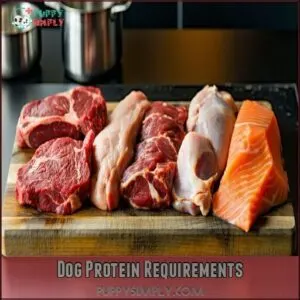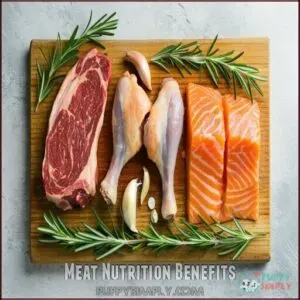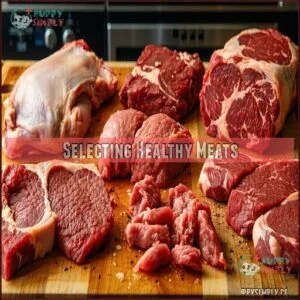This site is supported by our readers. We may earn a commission, at no cost to you, if you purchase through links.
 The best meats for dogs include chicken, beef, turkey, lamb, fish, and lean cuts of pork or duck.
The best meats for dogs include chicken, beef, turkey, lamb, fish, and lean cuts of pork or duck.
These meats provide high-quality protein, essential amino acids, and nutrients like iron, zinc, and omega-3 fatty acids that support muscle growth, energy, and a shiny coat.
Stick to lean options (skip the fatty bacon) and prepare them safely—grilling or boiling works great.
Avoid seasoning or bones that can splinter.
Each dog’s needs vary, so balance the portion size with their age, activity level, and health.
Remember, what fuels your pup safely today keeps those tail wags going strong tomorrow, and always keep them curious and safe!
Table Of Contents
- Key Takeaways
- Dog Protein Requirements
- Meat Nutrition Benefits
- Choosing Best Meat
- Meat Types for Dogs
- Preparing Meat Safely
- Feeding Meat to Dogs
- Selecting Healthy Meats
- Frequently Asked Questions (FAQs)
- What kind of meat can a dog eat?
- What meat should I never feed my dog if they have dementia?
- How do I choose the best meat for my Dog?
- Is meat good for dogs?
- What is the best dog food for dogs?
- Is beef good for dogs?
- What is the healthiest meat for dogs?
- What meat can my dog eat every day?
- What meat is best for dog digestion?
- What type of meat is good for bones?
- Conclusion
Key Takeaways
- Feed your dog lean meats like chicken, turkey, or fish to provide essential protein and nutrients without harmful fats or seasonings.
- Avoid processed meats and cooked bones, as they can harm your dog’s health and digestion.
- Match meat portions to your dog’s size, age, and activity level to ensure balanced nutrition and energy.
- Include omega-3-rich options like salmon for a shiny coat, joint health, and reduced inflammation.
Dog Protein Requirements
Feeding your dog the right amount of protein is essential for their overall health and energy.
Fuel your dog’s happiness and health with just the right protein—it’s their secret to endless energy and wagging tails!
Understanding their needs guarantees you’re giving them the best fuel for a happy, tail-wagging life.
Calculating Daily Protein Intake
Every dog’s protein needs vary, but a simple rule is about 1 gram per pound of body weight daily.
Activity levels, breed differences, or weight management may adjust this.
Protein supplements can fill gaps, but a balanced dog diet matters most.
For personalized advice, follow a dog nutrition guide or consult your vet.
Meat protein? Always a win!
Life Stage Protein Needs
Dogs need different protein levels at each life stage.
Puppies thrive on high-protein diets to fuel growth, while seniors benefit from easily digestible options to maintain muscle.
Pregnant or nursing dogs require extra protein for fetal development or milk production.
- Puppy Protein: High for growth stages.
- Senior Protein: Focus on amino acids.
- Pregnancy Needs: Boost protein intake.
Protein Sources for Dogs
Not sure where to start with protein sources? Meat protein for dogs—like chicken, beef, and fish—delivers essential building blocks for energy and growth.
Novel proteins, plant proteins, and even insect protein also shine in high-protein dog food.
Here’s a quick comparison:
| Protein Type | Benefits | Ideal For |
|---|---|---|
| Animal Protein | Complete amino acids | Tissue repair, muscle growth |
| Lean Meats | Low fat, high protein | Weight management |
| Protein Supplements | Easy digestion | Allergies or sensitivities |
The table highlights the benefits of different protein types, including complete amino acids from animal protein, which is ideal for tissue repair and muscle growth.
Meat Nutrition Benefits
Meat isn’t just tasty for your dog—it’s packed with essential nutrients that support their health.
Meat fuels your dog’s energy and health with vital nutrients, making every meal a step toward a happier, healthier pup.
From amino acids to vitamins and omega-3s, the right meats can keep your pup strong, energetic, and ready for belly rubs.
Essential Amino Acids
Meat protein for dogs supplies amino acids that handle protein synthesis, muscle repair, and immune support.
These are the building blocks behind enzyme production and hormone regulation, keeping your dog’s body in balance.
Since dogs can’t produce some amino acids, high-quality protein sources meet their nutritional needs.
Proper protein requirements guarantee your pup stays energized, making meat a cornerstone of nutritional balance!
Vitamin and Mineral Content
Meat’s nutritional profiles boost your dog’s health with essential vitamins and minerals. Here’s what they offer:
- Meat Mineral Density: Beef and organ meat nutrients deliver iron and zinc for energy and immunity.
- Vitamin Bioavailability: Chicken provides B6 for brain function.
- Fish Vitamin Profile: Salmon enriches with selenium for a shiny coat.
Supplementing meat diets enhances your pup’s energy effortlessly!
Omega-3 Fatty Acids
A healthy dog coat shines like the sun—omega-3 fatty acids can help you get there.
Found in salmon, fish oil, krill oil, and even algae sources, these fats reduce inflammation, boost skin health, and support joints.
Include lean meats for dogs or stick to dosage guidelines for supplements.
Remember, omega benefits go beyond beauty—they’re essential inside and out!
Choosing Best Meat
Choosing the best meat for your dog means balancing protein, nutrients, and digestibility to meet their specific needs.
It’s not just about picking what’s tasty—it’s about ensuring their meals keep them healthy and happy.
Evaluating Protein Sources
When picking protein sources, think protein digestibility, amino acid profiles, and source bioavailability.
Lean meats for dogs, like chicken or turkey, provide complete proteins that support muscle growth.
Novel proteins, such as kangaroo or bison, help dogs with allergies.
High protein dog food guarantees balance, but variety matters.
Explore meat options to meet your pup’s unique needs!
Considering Nutritional Content
Balancing nutrients isn’t just for humans—your dog needs it too!
High-quality meat delivers a punch of protein, plus vitamins like B12 for energy.
Stick to lean meat like chicken or turkey for fewer calories.
Look for macronutrient balance, micronutrient density, and bioavailability factors.
Pork, when cooked and served plain, offers omega-3 fatty acids.
Ingredient quality matters—treat fido’s meals like gourmet! Healthy protein, happy pup.
Assessing Digestibility
When weighing protein options, digestibility matters for keeping your dog’s gut happy.
High-quality meat, like lean cuts, supports digestion and nutrient absorption better than fatty or processed meats.
Meats with lower fiber content work wonders for dogs with sensitive stomachs or sluggish enzyme activity.
Prioritize easily digestible proteins to boost your pup’s energy, aid their gut microbiome, and match breed sensitivity needs, which can greatly impact their overall energy.
Meat Types for Dogs
Choosing the right meat for your dog can feel overwhelming, but it doesn’t have to be.
From beef to fish, each option offers unique benefits to keep your pup happy and healthy.
Beef Nutrition Benefits
Beef is a high-protein powerhouse packed with essential amino acids that support muscle health.
Its digestibility makes it a top choice for most dogs, though beef allergies can happen in some breeds.
Ground beef and lean beef cuts, like sirloin, are versatile and nutrient-rich.
Consider breed specifics to guarantee you’re choosing the tastiest, healthiest option for your pup!
Chicken as Lean Protein
Switching from beef’s hearty taste, chicken is an all-star lean protein for dogs. Packed with high protein and perfect for sensitive stomach diets, it’s a top pick, especially if dog food allergies are a concern.
You can also find options for lean protein diets for your dog.
- Cook thoroughly to avoid bone hazards.
- Opt for plain, unseasoned chicken.
- Consider skinless cuts for lower fat.
- Great variety for picky eaters!
Fish for Canine Health
If your pup loved chicken, they’ll thrive with fish. Packed with omega-3 fatty acids, fish boosts dog coat health, digestion, and reduces inflammation.
It’s great for dogs with food allergies, offering a novel protein. Safe options like salmon provide essential nutrients.
Aim for safe fish preparation—always cook thoroughly to avoid toxicity concerns. Sustainable sourcing guarantees quality while protecting our oceans.
Preparing Meat Safely
You want the best for your dog, so preparing their meat safely is essential to keep them healthy and happy.
From cooking thoroughly to avoiding harmful ingredients, a little extra care goes a long way, and preparing their meat safely is crucial for their well-being.
Cooking Methods for Dogs
Cooking meat for your dog? Stick to safe methods like boiling, baking, or grilling.
Always hit a safe internal temperature to avoid bacteria. Skip toxic additives like salt or spices, and watch out for bone hazards—cooked bones splinter!
Practice good food handling practices and portion control. Allergy considerations? Test small amounts first.
For ideal canine health, consider fresh dog food recipes. Safe cooking equals happy tails!
Dehydrating Meat for Dogs
Dehydrating meat for dogs is a fantastic way to make healthy, homemade treats while retaining nutrition.
Choose lean meat cuts to prevent spoilage, and use safe temperatures (around 160°F) for food safety.
Dehydration improves storage methods, as dried treats last longer without refrigeration.
Consider using a specialized dehydrating machine for ideal results.
It’s an easy dog food preparation technique that locks in flavor and delivers maximum nutritional retention with minimal effort.
Raw Feeding Considerations
Raw feeding offers benefits but comes with responsibility.
A raw meat diet demands food safety, like freezing pork and salmon to avoid parasites and guarding against bacterial contamination risks.
Bones help teeth but carry feeding risks—never use cooked ones.
Nutritional completeness is key, following BARF diet guidelines.
Ignore dog food salmonella chatter? Not smart!
Cleanliness prevents dog food bacterial infections.
Feeding Meat to Dogs
Feeding your dog meat is one of the best ways to meet their protein needs and keep them healthy.
By choosing the right cuts and portions, you can give them a meal that’s as nutritious as it’s delicious.
Daily Protein Intake Guidelines
Your dog’s protein needs depend on size and activity levels. Generally, dogs need about 1 gram of protein per pound daily.
Choose lean proteins like chicken or turkey for weight management. Check dog food ingredients too! A raw dog feeding approach offers unprocessed ingredients.
- Opt for high protein dog food for active breeds.
- Adjust for health conditions like kidney issues.
- Prioritize balanced dog food nutrition.
Life Stage Protein Requirements
Every growth stage needs customized nutrition.
Puppies thrive on high protein puppy food (22-28%) for development, while adult dogs need 18% for maintenance.
Seniors may require adjusted protein based on health—senior dog food helps address these needs.
Pregnant and lactating dogs need 25-35% protein to support babies.
Choose lean proteins for balanced dog food nutrition at every life stage to ensure high protein support.
Calculating Protein Needs
Knowing your pup’s protein needs keeps tails wagging! Factors like size, activity, and breed play a role in protein calculation.
On average, dogs need 1 gram of protein per pound of body weight.
Consider these:
- High-quality meat boosts protein digestibility.
- Activity level impacts daily intake.
- Breed-specific needs vary.
- Balance dog food proteins with fresh options.
- Consult a veterinary nutritionist to ensure you’re meeting your dog’s specific protein needs.
Selecting Healthy Meats
When choosing meats for your dog, focus on quality to guarantee they get the best nutrition possible.
Skip processed options and stick with fresh cuts to keep their meals healthy and safe.
Organic and Free-Range Options
Choosing organic dog meat or pasture-raised options offers great nutritional and ethical benefits.
Grass-fed and freerange meats, like beef or chicken, are often higher in essential nutrients while supporting ethical sourcing.
However, availability issues and cost analysis might make these choices tricky.
Prioritize quality over quantity—organic benefits outweigh free-range concerns when you’re investing in your pup’s health and happiness.
Avoiding Processed Meats
Processed meats aren’t your dog’s best friend and can sneak in harmful ingredients.
Look out for these pitfalls:
- Sodium content: High levels can harm dog health.
- Fat concerns: Excess fats upset digestion.
- Additives dangers: Nitrates and preservatives spell trouble.
- Reading labels: Avoid anything overly processed.
- Safe alternatives: Stick to fresh, cooked, or dehydrated healthy dog meat for safe meals!
Handling and Storage Safety
Handling meat safely is vital for keeping your pup healthy.
Practice safe thawing by defrosting meat in the fridge, not the counter, to avoid harmful bacteria. Always use airtight containers and follow proper storage durations.
Proper techniques for meat thawing products can further enhance safety. Prevent cross-contamination by washing utensils.
Don’t gamble with spoiled food—if it smells off, toss it. Temperature control matters for dog food safety!
Frequently Asked Questions (FAQs)
What kind of meat can a dog eat?
Ever wondered what meats your dog can enjoy safely?
Try cooked chicken, beef, turkey, or fish like salmon.
Avoid bones, seasoning, or processed meats.
Keep it simple, safe, and balanced for their health!
What meat should I never feed my dog if they have dementia?
Avoid feeding your dog processed meats like bacon or sausages, as well as fatty cuts, seasoned foods, and anything with garlic or onion.
These can worsen dementia symptoms or harm their overall health.
Keep it simple!
How do I choose the best meat for my Dog?
Choosing the best meat for your dog is like picking the perfect playlist—they need variety, balance, and quality.
Opt for lean, cooked meats like chicken or turkey, avoiding seasoning, bones, and toxic ingredients.
Is meat good for dogs?
Meat’s great for dogs!
It’s packed with protein for muscle growth and energy.
Lean, cooked options like chicken or beef work best.
Just skip seasoning, bones, or fatty cuts to keep your pup healthy.
What is the best dog food for dogs?
The best dog food depends on your pup’s needs.
Look for high-quality options with meat as the first ingredient, balanced nutrients, and no artificial additives.
Consult your vet to confirm you’re meeting their dietary requirements, ensuring you provide the best for your pet with balanced nutrients.
Is beef good for dogs?
Beef is fantastic for dogs, like a power-packed fuel for their bodies.
It’s rich in protein, iron, and B vitamins, which support muscle strength and energy.
Just stick to lean cuts and cook thoroughly!
What is the healthiest meat for dogs?
You can’t go wrong with lean meats like chicken, turkey, or fish.
They’re packed with protein, low in fat, and easy to digest.
Just cook them thoroughly – no spices or onions, please!
What meat can my dog eat every day?
Funny enough, dogs can eat meats like chicken, turkey, or lean beef daily, as they’re nutritious and packed with protein.
Avoid processed or fatty cuts, and always cook meat thoroughly to keep your pup safe, it is a complete concept to prioritize their health.
What meat is best for dog digestion?
For easy digestion, go with lean, cooked chicken or turkey.
They’re gentle on the stomach and packed with protein.
Avoid fatty cuts and seasoning—your dog’s tummy will thank you for keeping it simple.
What type of meat is good for bones?
Lean meats like chicken and turkey, rich in protein and phosphorus, help support strong bones.
Add cooked fish like salmon for omega-3s, which boost joint health.
Keep portions balanced—too much can upset digestion!
Conclusion
Feeding your dog the best meats is like offering them a ticket to a healthier, happier life.
Lean options like chicken, beef, and fish give your pup the protein, vitamins, and omega-3s they need for strong muscles, boundless energy, and a shiny coat.
Avoid fatty cuts or seasoning—keep it simple and safe.
Every dog is unique, so match their meals to their age, health, and activity level.
A well-fed dog is a wagging, curious companion, living a happier life.
- https://www.thehonestkitchen.com/blogs/pet-food-ingredients/healthy-meat-for-dogs?srsltid=AfmBOoqeOAqE2BYeDGzmzrNFvJ_0pD3668Hy1dZ2kAczLIjbuJ9-nmqs
- https://doggiliciouus.com/2022/04/04/five-types-of-meat-considered-to-be-the-best-for-dogs/
- https://petzyo.com.au/blogs/guides/what-is-the-best-meat-for-dogs?srsltid=AfmBOorOJjJ2f3bJbtCTJz6CMrJvzjU0GYba1i6Q137_eLc1Q2FwGdql
- https://blog.myollie.com/best-meat-for-dogs/
- https://www.quora.com/What-is-the-best-type-of-meat-for-dogs-to-eat-regularly-Is-it-safe-for-them-to-consume-chicken-pork-beef-lamb-or-fish

















